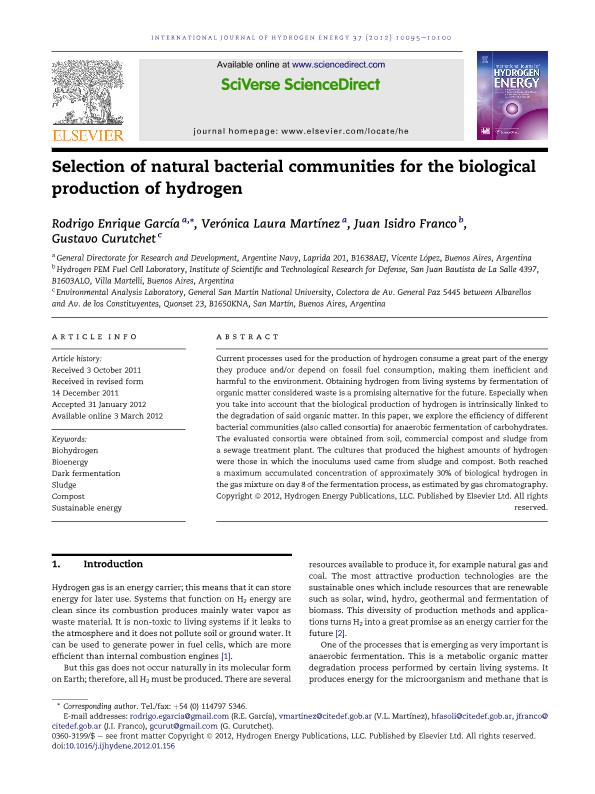Mostrar el registro sencillo del ítem
dc.contributor.author
García, Rodrigo Enrique
dc.contributor.author
Martínez, Verónica Laura
dc.contributor.author
Franco, Juan Isidro

dc.contributor.author
Curutchet, Gustavo Andres

dc.date.available
2023-03-29T14:35:38Z
dc.date.issued
2012-07
dc.identifier.citation
García, Rodrigo Enrique; Martínez, Verónica Laura; Franco, Juan Isidro; Curutchet, Gustavo Andres; Selection of natural bacterial communities for the biological production of hydrogen; Pergamon-Elsevier Science Ltd; International Journal of Hydrogen Energy; 37; 13; 7-2012; 10095-10100
dc.identifier.issn
0360-3199
dc.identifier.uri
http://hdl.handle.net/11336/192004
dc.description.abstract
Current processes used for the production of hydrogen consume a great part of the energy they produce and/or depend on fossil fuel consumption, making them inefficient and harmful to the environment. Obtaining hydrogen from living systems by fermentation of organic matter considered waste is a promising alternative for the future. Especially when you take into account that the biological production of hydrogen is intrinsically linked to the degradation of said organic matter. In this paper, we explore the efficiency of different bacterial communities (also called consortia) for anaerobic fermentation of carbohydrates. The evaluated consortia were obtained from soil, commercial compost and sludge from a sewage treatment plant. The cultures that produced the highest amounts of hydrogen were those in which the inoculums used came from sludge and compost. Both reached a maximum accumulated concentration of approximately 30% of biological hydrogen in the gas mixture on day 8 of the fermentation process, as estimated by gas chromatography.
dc.format
application/pdf
dc.language.iso
eng
dc.publisher
Pergamon-Elsevier Science Ltd

dc.rights
info:eu-repo/semantics/openAccess
dc.rights.uri
https://creativecommons.org/licenses/by-nc-sa/2.5/ar/
dc.subject
BIOENERGY
dc.subject
BIOHYDROGEN
dc.subject
COMPOST
dc.subject
DARK FERMENTATION
dc.subject
SLUDGE
dc.subject
SUSTAINABLE ENERGY
dc.subject.classification
Bioprocesamiento Tecnológico, Biocatálisis, Fermentación

dc.subject.classification
Biotecnología Industrial

dc.subject.classification
INGENIERÍAS Y TECNOLOGÍAS

dc.title
Selection of natural bacterial communities for the biological production of hydrogen
dc.type
info:eu-repo/semantics/article
dc.type
info:ar-repo/semantics/artículo
dc.type
info:eu-repo/semantics/publishedVersion
dc.date.updated
2023-03-23T12:30:53Z
dc.journal.volume
37
dc.journal.number
13
dc.journal.pagination
10095-10100
dc.journal.pais
Estados Unidos

dc.journal.ciudad
San Francisco
dc.description.fil
Fil: García, Rodrigo Enrique. Ministerio de Defensa. Armada Argentina. Dirección Gral. de Investigación y Desarrollo de la Ara; Argentina
dc.description.fil
Fil: Martínez, Verónica Laura. Ministerio de Defensa. Instituto de Investigaciones Científicas y Técnicas para la Defensa; Argentina
dc.description.fil
Fil: Franco, Juan Isidro. Consejo Nacional de Investigaciones Científicas y Técnicas; Argentina. Ministerio de Defensa. Instituto de Investigaciones Científicas y Técnicas para la Defensa; Argentina
dc.description.fil
Fil: Curutchet, Gustavo Andres. Universidad Nacional de San Martín; Argentina. Consejo Nacional de Investigaciones Científicas y Técnicas; Argentina
dc.journal.title
International Journal of Hydrogen Energy

dc.relation.alternativeid
info:eu-repo/semantics/altIdentifier/url/http://www.sciencedirect.com/science/article/pii/S0360319912002984
dc.relation.alternativeid
info:eu-repo/semantics/altIdentifier/doi/http://dx.doi.org/10.1016/j.ijhydene.2012.01.156
Archivos asociados
